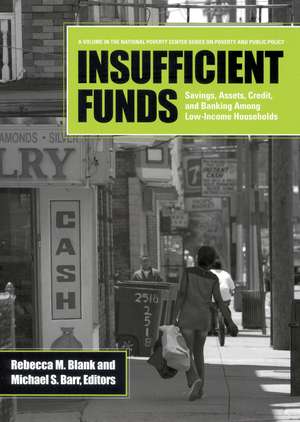RSF: The Russell Sage Foundation Journal of the Social Sciences: Financial Reform: Preventing the Next Crisis: RSF: The Russell Sage Foundation Journal of the Social Sciences
Editat de Michael S. Barren Limba Engleză Paperback – 3 ian 2017 – vârsta ani
The 2008 financial crash and the ensuing Great Recession resulted from decades of unconstrained excess and failures of risk management on Wall Street and complacency in Washington. While the 2010 Dodd-Frank Act sought to curtail these abuses, more work remains to be done. This issue of RSF, edited by Michael S. Barr, sets out proposals for comprehensive financial reform. Contributors suggest how to improve financial regulation, make markets more resilient, and increase protections for consumers and investors in order to lower the likelihood of a future crisis.
Several contributors evaluate the Dodd-Frank bill which mandated greater federal oversight of banks, increased regulation of credit rating agencies, and established the Consumer Financial Protection Bureau (CFPB), among other measures. Martin Baily and coauthors conclude that measures that require greater transparency and oversight in derivatives transactions have made financial institutions more resilient. Yet, the bill’s attempts to consolidate the fragmented financial regulatory system have not gone far enough.
Lauren Willis argues that instead of simply issuing disclosures, financial service providers should be required to meet more rigorous performance standards, such as proving through third-party testing that customers understand their fees and surcharges. John Macey advocates reforms that would afford home mortgage borrowers the same protections as investors in the securities market, including regulations that prevent brokers from encouraging borrowers to refinance their mortgages to collect fees.
The issue also addresses global financial regulation. Viral Achara examines the financial sectors in the U.S., Europe, and Asia, and assesses their vulnerability to capital shortfalls in the event of a future crisis. Niamh Moloney finds that institutions established in the wake of the crash, such as the European Supervisory Authorities, have improved European-level prudential and consumer financial regulations and have the potential to increase the EU’s influence in international financial governance.
The effects of the financial crisis continue to reverberate around the world today. Together, the articles in this issue document the steps necessary for creating a more robust financial system that works better for all consumers, investors and the financial system itself.
Several contributors evaluate the Dodd-Frank bill which mandated greater federal oversight of banks, increased regulation of credit rating agencies, and established the Consumer Financial Protection Bureau (CFPB), among other measures. Martin Baily and coauthors conclude that measures that require greater transparency and oversight in derivatives transactions have made financial institutions more resilient. Yet, the bill’s attempts to consolidate the fragmented financial regulatory system have not gone far enough.
Lauren Willis argues that instead of simply issuing disclosures, financial service providers should be required to meet more rigorous performance standards, such as proving through third-party testing that customers understand their fees and surcharges. John Macey advocates reforms that would afford home mortgage borrowers the same protections as investors in the securities market, including regulations that prevent brokers from encouraging borrowers to refinance their mortgages to collect fees.
The issue also addresses global financial regulation. Viral Achara examines the financial sectors in the U.S., Europe, and Asia, and assesses their vulnerability to capital shortfalls in the event of a future crisis. Niamh Moloney finds that institutions established in the wake of the crash, such as the European Supervisory Authorities, have improved European-level prudential and consumer financial regulations and have the potential to increase the EU’s influence in international financial governance.
The effects of the financial crisis continue to reverberate around the world today. Together, the articles in this issue document the steps necessary for creating a more robust financial system that works better for all consumers, investors and the financial system itself.
Preț: 210.96 lei
Nou
Puncte Express: 316
Preț estimativ în valută:
40.37€ • 41.79$ • 34.12£
40.37€ • 41.79$ • 34.12£
Carte indisponibilă temporar
Doresc să fiu notificat când acest titlu va fi disponibil:
Se trimite...
Preluare comenzi: 021 569.72.76
Specificații
ISBN-13: 9780871540270
ISBN-10: 0871540274
Pagini: 154
Dimensiuni: 178 x 254 x 15 mm
Ediția:1
Editura: Russell Sage Foundation
Colecția Russell Sage Foundation
Seria RSF: The Russell Sage Foundation Journal of the Social Sciences
ISBN-10: 0871540274
Pagini: 154
Dimensiuni: 178 x 254 x 15 mm
Ediția:1
Editura: Russell Sage Foundation
Colecția Russell Sage Foundation
Seria RSF: The Russell Sage Foundation Journal of the Social Sciences
Notă biografică
MICHAEL S. BARR is Roy F. and Jean Humphrey Proffitt Professor of Law at the University of Michigan.
Contributors: Viral V. Acharya, Martin Neil Baily, Michael S. Barr, Howell E. Jackson, Aaron Klein, Jonathan Macey, Stephanie Massman, Niamh Moloney, Justin Schardin, Elaine Wah, Michael P. Wellman, Lauren E. Willis
Contributors: Viral V. Acharya, Martin Neil Baily, Michael S. Barr, Howell E. Jackson, Aaron Klein, Jonathan Macey, Stephanie Massman, Niamh Moloney, Justin Schardin, Elaine Wah, Michael P. Wellman, Lauren E. Willis















